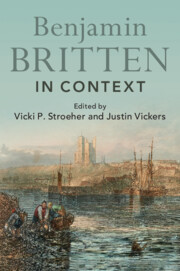Book contents
- Benjamin Britten in Context
- Composers in Context
- Benjamin Britten in Context
- Copyright page
- Dedication
- Contents
- Figures
- Tables
- Notes on Contributors
- Acknowledgements
- Bibliographic and In-Text Abbreviations
- Prologue
- Part I The Britten Circle(s)
- Part II British Musical Life
- Part III Britten and Other Composers
- Part IV Wordsmiths, Designers, and Performers
- Part V British Sociocultural, Religious, and Political Life
- Chapter 34 English and British National Identity in the Arts
- Chapter 35 The Place Within
- Chapter 36 Monarchy, Royalty, and Arts Patronage
- Chapter 37 Literary Leanings
- Chapter 38 Faith, Spirituality, and the Church
- Chapter 39 The Politics of the Closet
- Chapter 40 Communism, Socialism, and Pacifism in British Politics
- Epilogue Britten’s Legacy
- Further Reading
- Index
Chapter 39 - The Politics of the Closet
from Part V - British Sociocultural, Religious, and Political Life
Published online by Cambridge University Press: 31 March 2022
- Benjamin Britten in Context
- Composers in Context
- Benjamin Britten in Context
- Copyright page
- Dedication
- Contents
- Figures
- Tables
- Notes on Contributors
- Acknowledgements
- Bibliographic and In-Text Abbreviations
- Prologue
- Part I The Britten Circle(s)
- Part II British Musical Life
- Part III Britten and Other Composers
- Part IV Wordsmiths, Designers, and Performers
- Part V British Sociocultural, Religious, and Political Life
- Chapter 34 English and British National Identity in the Arts
- Chapter 35 The Place Within
- Chapter 36 Monarchy, Royalty, and Arts Patronage
- Chapter 37 Literary Leanings
- Chapter 38 Faith, Spirituality, and the Church
- Chapter 39 The Politics of the Closet
- Chapter 40 Communism, Socialism, and Pacifism in British Politics
- Epilogue Britten’s Legacy
- Further Reading
- Index
Summary
The relation between Britten’s sexuality and his music has been an abiding fascination for biographers and music scholars in recent decades. The fact that homosexuality was illegal in the UK until 1967, and that he and his long-term partner, Peter Pears, therefore had to live a homosexual life as an ‘open secret’ for most of their lives, often lends this critical emphasis a kind of heroic poignancy. This chapter contrasts Britten and Pears’s upper-middle-class experience of forbidden sexuality with that of the overwhelming majority of twentieth-century British men and women, to paint a more rounded picture of the politics of the closet. It shows how early twenty-first-century ideas about sexual ‘identity’ obscure the differences between class experience, and distort our understanding of the issue.
Keywords
- Type
- Chapter
- Information
- Benjamin Britten in Context , pp. 343 - 350Publisher: Cambridge University PressPrint publication year: 2022

